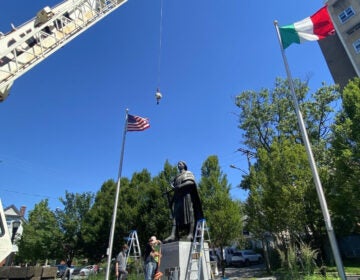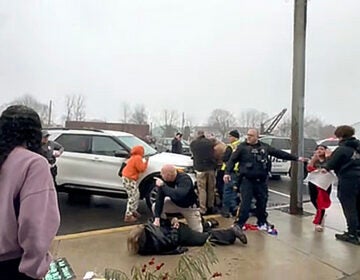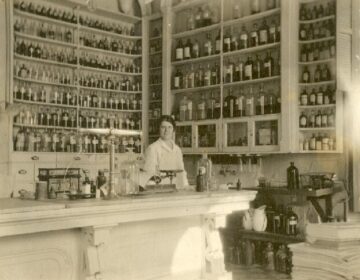This South Philly hydroponic vertical farm is booming and has plans to go restaurant
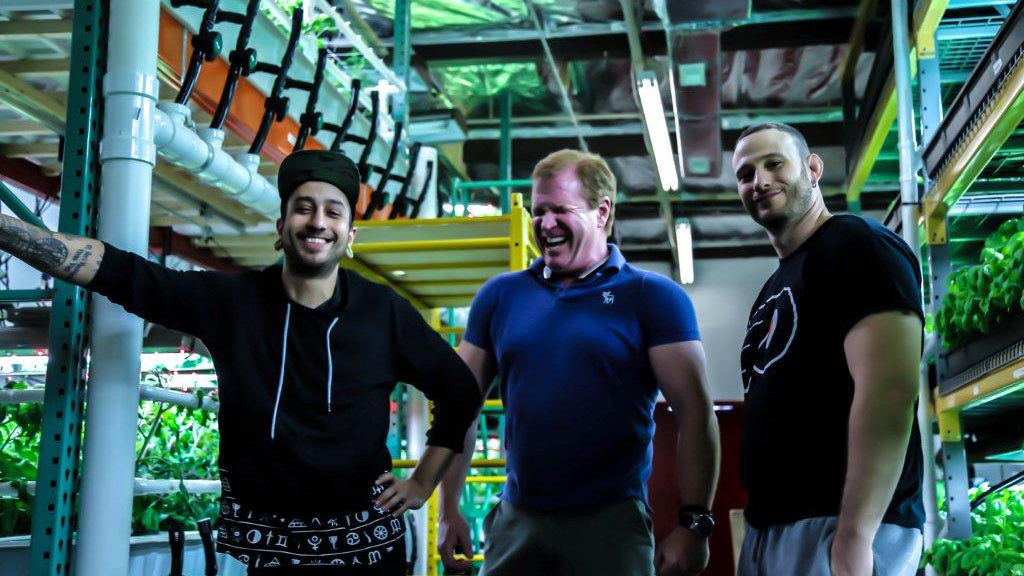
John Paul Ramos, Jack Griffin, and Lee Weingrad operate a booming South Philly hydroponic vertical farm. (Jason Sherman/Technical.ly Philly)
What do South Philly, changing the world, and tomatoes have in common? Probably more than I realize. But at least one common denominator is Metropolis Farms, a vertical-farming, hydroponic, vegan farm on South Water Street.
And don’t try to walk by and glance in the window. They’re on the second floor — a first for vertical urban farming.
“The landlord had faith in us to let us put thousands of pounds of water over his head and prove that it wouldn’t leak,” says Jack Griffin, president of Metropolis. “That makes it possible for others to try it. Proving it by showing it is a different thing from just talking about it.”
There are other records being set there, too. Griffin, who joined forces with his friend and now VP of operations Lee Weingrad to launch the venture about a year ago, says that Metropolis is the first vegan-certified farm in North America. But as a confirmed omnivore, what really interested me was why this former venture capitalist is up to his elbows in the nutrient-rich water of hydroponic farming.
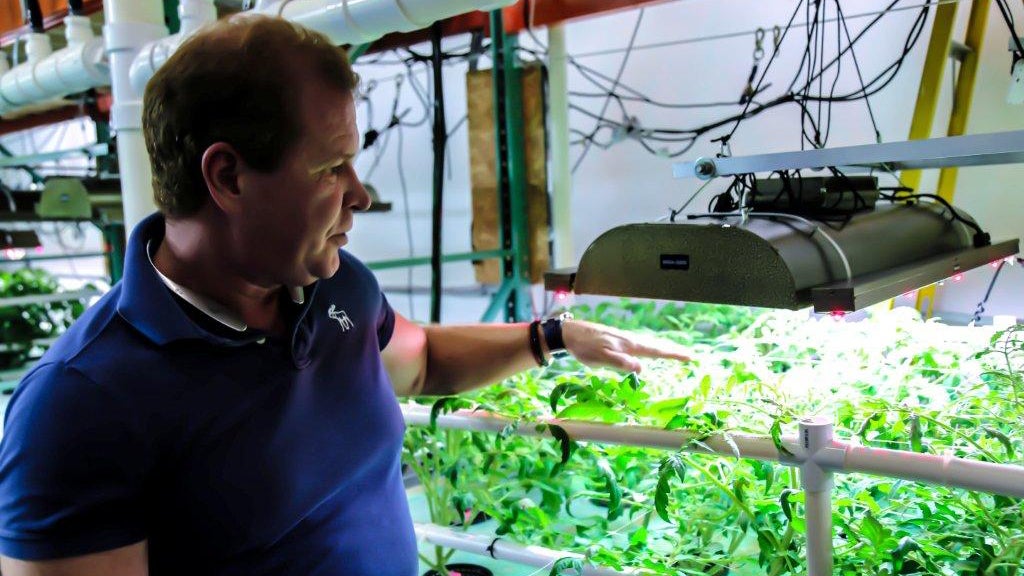 Jack Griffin wants to create urban farming technology that is adaptable, scalable, and easy to use. (Jason Sherman/Technical.ly Philly)
Jack Griffin wants to create urban farming technology that is adaptable, scalable, and easy to use. (Jason Sherman/Technical.ly Philly)
It’s everyone’s problem, so let’s make is easy for anyone
Griffin, who studied economics, cites 18th-century economist Thomas Malthus. The big issue is that availability of farmland won’t be able to keep up with the world’s population. “The people we touch, the people we love, will starve if we don’t figure it out,” says Griffin. “It’s my children and your children who will be impacted by this. So either we take care of it, or they don’t eat.”
Which is a great idea. But for lots of urban folks, it can seem overwhelming to know where to begin. Griffin’s vision extends to know-how, as well, where he maintains the ideal of “show, don’t tell.”
“We want to show that the [urban vertical] tech was adaptable,” he says. “How much available space, like nooks, second-floor space, gets wasted, or never offers a job?Growing a significant amount of food in an economically viable model means we can bring artesian farmers back, and that anybody can do this. With a lot of the vertical farming out there, I see the very sophisticated equipment, and I think it must cost so much. But they’re over-engineering it. The average person can do this. The goal is to make it simple.”
His conviction may be global, but he’s definitely thinking locally — and learning in the process.
“The farm we’re currently working on with NetCost markets will be the world’s largest vertical farm,” Griffin says. “I’m a huge proponent for small local farms that are in the community. That’s been my thing from Day One. So I’m sort of eating my words with it being the world’s largest. But we’re doing it because it makes sense from the point of view of the market. We can still do local markets and partner with local partners. I’d like to do one in West Philly, one in Northern Liberties, to support communities there.”
Seeding the local economy
He’s a native Philly boy, and between that and his background in economics, Griffin says that he’s always thinking about creating jobs for people. “There are 6.5 million people in the Philadelphia area,” he says. “That’s lots of opportunities for farms. Local farms mean people contribute to our local economy.”
Those jobs could take shape in a range of ways associated with urban vertical farming. Griffin, Weingrad, and their colleagues hope to continue to explore creative options, including partnering with local restaurants, where chefs can order their food in advance so that it’s grown specifically for them; situating a farm inside a city restaurant, where people can choose the produce that will be cooked for them; and even an urban farming school.
“It’s not enough for us to have this phenomenal equipment if we don’t teach people,” Griffin says.
His idealism remains tempered by the realism he learned working on Wall Street. “The economist in me knows people operate on self-interest,” he says. “If I can show a company how they can make money doing this, that change will happen. You want to get rich people to believe in global warming, show them how to make money from it.”
He sums the whole thing up as a shift from the current “farm to table” model to “farm to fork” — meaning, delivered straight to your mouth.
But that’s not the only model Griffin uses. Evoking an ancient wisdom, he says, “I was an inner city kid. I’ve always loved nature, but when I initially saw this, I saw an opportunity to make an impact. My theory is … do what you can to better the world, and if you can’t, at least try not to screw it up. … If you keep your head down and do this, maybe you help the future. Maybe we can make it open source, so everyone can use it. It’ll be a kid in a garage who uses our technology one day and makes something amazing out of it. … If we push in that direction, we have a better future than if we sit here and do nothing.”
—
For more details about how the farm operates, see Jason Sherman’s arrticle in Technical.ly Philly, “The farm of the future is right here in Philadelphia.”
WHYY is your source for fact-based, in-depth journalism and information. As a nonprofit organization, we rely on financial support from readers like you. Please give today.


